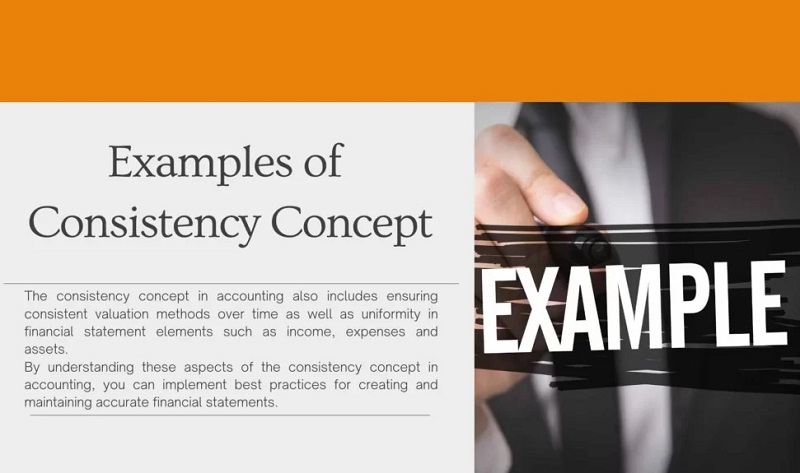
Investing for Small Businesses: The Untold Truth About Tax Implications You NEED to Know
April 29, 2024
It’s Not Magic, It’s Bookkeeping Basics! The Simple Guide to Financial Freedom
May 15, 2024Part 1: The Cornerstone of Financial Reporting – Consistent Accounting
Financial reporting serves as the cornerstone of transparency and trust in the business world. It allows investors, creditors, and other stakeholders to assess a company’s financial health, performance, and future prospects. However, the usefulness of financial information hinges on one crucial principle: consistent accounting.
What is Consistent Accounting?
Consistent accounting refers to the uniform application of accounting principles, methods, and procedures across different accounting periods. In simpler terms, companies should use the same accounting rules to record and report their financial transactions year after year. This ensures that financial statements are comparable and provide a clear picture of a company’s financial performance over time.
Here are some key aspects of consistent accounting:
-
Definition and Core Principles: Consistent accounting is built on the foundation of established accounting standards frameworks, such as Generally Accepted Accounting Principles (GAAP) or International Financial Reporting Standards (IFRS). These frameworks provide guidelines for recognizing, measuring, recording, and disclosing financial information. Consistent application of these standards across periods ensures reliability and comparability of financial data.
-
Importance of Applying Accounting Standards Consistently: Consistent accounting practices are essential for several reasons. They promote transparency by allowing stakeholders to understand how a company’s financial performance has evolved over time. This transparency fosters trust in financial reporting and facilitates informed decision-making by investors, creditors, and other stakeholders. Additionally, consistent accounting streamlines the process of financial analysis and budgeting for companies.
Benefits of Consistent Accounting
Consistent application of accounting principles offers a multitude of benefits for companies, investors, and the financial system as a whole. Here’s a closer look at some key advantages:
-
Improved Financial Transparency and Comparability: When companies use consistent accounting methods, their financial statements become more transparent and comparable across reporting periods. This allows investors and analysts to easily track a company’s financial performance over time and compare it to competitors who use the same accounting standards. Consistent accounting eliminates the confusion caused by shifting accounting methods, leading to a clearer picture of a company’s financial health.
-
Enhanced Decision-Making for Investors and Creditors: Reliable and comparable financial information empowers investors and creditors to make informed investment and lending decisions. Consistent accounting practices ensure that the financial data they analyze accurately reflects a company’s true financial position and performance. This reduces the risk of making decisions based on misleading or misinterpreted financial information.
-
Increased Trust and Accountability in Financial Reporting: Consistent accounting fosters a culture of trust and accountability in financial reporting. Stakeholders gain confidence in the accuracy and reliability of financial information, knowing that companies are applying the same accounting rules consistently. This fosters a healthy financial ecosystem where stakeholders can rely on the reported information to make sound financial decisions.
-
Streamlined Financial Analysis and Budgeting Processes: Consistent accounting methods simplify the process of financial analysis for investors and analysts. They can readily compare a company’s financial data across periods without having to adjust for changes in accounting methods. Similarly, consistent accounting practices allow companies to develop more reliable budgets and forecasts based on historical financial data. This facilitates better financial planning and resource allocation within the organization.
Examples of Consistency in Accounting
The principle of consistency applies to various aspects of financial reporting. Here are some illustrations of how companies maintain consistent accounting:
-
Consistent application of depreciation methods: Companies should consistently use the same method (e.g., straight-line depreciation, accelerated depreciation) to calculate the depreciation expense of their assets across their useful lives. This ensures a consistent recognition of the cost of these assets over time.
-
Uniform treatment of inventory valuation: Companies should consistently use the same method (e.g., FIFO, LIFO) to value their inventory at the end of each accounting period. This ensures that the reported value of inventory reflects the same costing assumptions consistently.
-
Standardized recognition of revenue and expenses: Companies should consistently recognize revenue when it is earned and expenses when they are incurred, following the established accounting standards. This ensures a clear picture of the company’s profitability and financial performance in a given period.
Challenges to Maintaining Consistent Accounting
While consistent accounting offers significant benefits, there are also challenges that companies may face in upholding this principle. Here are some of the potential roadblocks:
-
Complex accounting standards with room for interpretation: Accounting standards frameworks like GAAP and IFRS can be complex and leave room for interpretation. Companies may make subjective choices in applying these standards, which can lead to inconsistencies in their financial reporting, particularly in areas with more flexibility.
-
Pressure to manipulate financial statements for short-term gains: Unfortunately, some companies may be tempted to deviate from consistent accounting practices to manipulate their financial statements and present a more favorable picture for short-term gains. This can be detrimental to the long-term trust and credibility of the company.
-
Lack of internal controls and enforcement mechanisms: Weak internal controls over financial reporting can create an environment where inconsistencies go undetected or unreported. Additionally, a lack of strong enforcement mechanisms from regulatory bodies may discourage companies from prioritizing consistent accounting practices.
Despite these challenges, maintaining consistent accounting remains crucial for ensuring the integrity and reliability of financial reporting. By implementing appropriate safeguards and adhering to established accounting frameworks, companies can overcome these hurdles and reap the significant benefits of consistent accounting.
Part 2: Ensuring Consistency in Accounting Practices
Consistent application of accounting principles is paramount for fostering trust and transparency in financial reporting. However, achieving and maintaining consistency requires a proactive approach. This section explores key strategies for companies to ensure consistent accounting practices.
Choosing the Right Accounting Standards Framework
The foundation of consistent accounting lies in selecting the appropriate accounting standards framework. Here’s a breakdown of the two most widely used frameworks:
-
Generally Accepted Accounting Principles (GAAP): Established by the Financial Accounting Standards Board (FASB) in the United States, GAAP is the prevailing accounting standards framework for U.S. companies.
-
International Financial Reporting Standards (IFRS): Developed by the International Accounting Standards Board (IASB), IFRS is a set of internationally recognized accounting standards adopted by many countries outside the U.S.

Factors to Consider When Selecting a Framework:
- Company size and location: Publicly traded companies often have specific requirements to follow GAAP or IFRS depending on their location.
- Industry best practices: Certain industries may have established norms regarding the preferred accounting framework.
- Complexity and cost of implementation: IFRS can be more complex than GAAP, and implementing either framework may require investment in training and system upgrades.
Consistency Within the Chosen Framework:
Whichever framework is chosen, it’s crucial to apply it consistently throughout the company’s financial reporting. This includes:
- Selecting specific accounting policies within the framework (e.g., depreciation method, inventory valuation method).
- Applying these policies uniformly across all accounting periods and transactions of a similar nature.
- Disclosing any accounting policy changes in the financial statements along with their impact on the reported financials.
Implementing Consistent Accounting Policies
Once a framework is selected, companies need to establish a system for consistent accounting application. Here are some key steps:
- Establishing clear and documented accounting policies: A well-defined accounting manual outlining the chosen framework, specific accounting policies, and their application guidelines ensures consistency across departments.
- Training staff on consistent application of these policies: Regular training for accounting personnel on the chosen framework and company-specific accounting policies is vital for ensuring everyone understands the correct application procedures.
- Regular review and update of accounting policies: Accounting standards and best practices evolve over time. Regularly reviewing and updating accounting policies ensures the company remains compliant with the latest guidelines.
By following these steps, companies can lay a solid foundation for consistent accounting practices.
Maintaining Consistency Over Time
Upholding consistent accounting practices throughout an organization’s operations requires ongoing vigilance. Here are some strategies to maintain consistency over time:
-
Importance of a strong internal control environment: A robust system of internal controls over financial reporting helps to identify and prevent inconsistencies in accounting practices. This includes clear segregation of duties, regular reconciliations, and proper documentation of accounting processes.
-
Role of the audit committee in overseeing accounting practices: The audit committee, a board-level committee responsible for overseeing financial reporting, plays a crucial role in ensuring consistent accounting practices. The committee should review accounting policies, interact with the internal audit team, and address any potential inconsistencies identified during the audit process.
-
Mitigating the risk of accounting changes and errors: Changes in accounting policies or the occurrence of material accounting errors can disrupt consistency. Companies should have a formal process for evaluating the need for accounting policy changes, ensuring these changes are justified and properly disclosed. Additionally, establishing strong internal controls and a culture of ethical accounting practices helps minimize the risk of errors.

Addressing Inconsistency in Historical Data
In some cases, companies may discover inconsistencies in their historical financial data. Here’s how they can address this issue:
-
Retroactive application vs. restatement of financial statements: For minor inconsistencies, companies may choose to retroactively apply the correct accounting policy from the beginning. This involves adjusting prior period financial statements to reflect the consistent application. For more significant inconsistencies, a restatement of financial statements may be necessary. This involves revising previously issued financial statements to reflect the correct accounting treatment.
-
Disclosures and explanations for accounting changes: Whenever there is a change in accounting policy, companies must clearly disclose this change and its impact on the financial statements. This transparency helps investors understand the rationale behind the change and its effect on the reported financial information.
-
Maintaining transparency during periods of inconsistency: During periods when historical data is being adjusted due to inconsistencies, companies should maintain a high level of transparency in their communication with stakeholders. This includes clearly explaining the nature of the inconsistency, the corrective actions taken, and the impact on the financial statements.
By implementing these strategies, companies can ensure consistent accounting practices over the long term, even when faced with challenges or historical inconsistencies.
Part 3: The Impact of Consistent Accounting on Stakeholders
Consistent application of accounting principles fosters a healthy financial ecosystem where different stakeholders can make informed decisions based on reliable financial information. Let’s delve into the specific benefits that consistent accounting offers to various groups.
Benefits for Investors and Analysts
-
Ability to compare financial performance across companies: Consistent accounting allows investors and analysts to compare a company’s financial performance to its competitors and the industry as a whole. This is because companies using the same accounting standards report their financial results in a similar way, making comparisons more meaningful.
-
Improved reliability and accuracy of financial information: Consistent accounting practices ensure that financial statements accurately reflect a company’s true financial position and performance. This reduces the risk of investors making decisions based on misleading or misinterpreted data.
-
More informed investment decisions based on consistent data: When financial information is reliable and comparable, investors can make more informed investment decisions. They can assess the relative risk and potential return of different investment options with greater confidence.
-
Reduced risk of misleading financial statements: Consistent accounting practices help to mitigate the risk of companies manipulating their financial statements to present a more favorable picture. This fosters trust in the financial reporting system and protects investors from making investment decisions based on false information.
Value for Creditors and Lenders
-
Enhanced assessment of a company’s financial health: Consistent accounting allows creditors and lenders to more accurately assess a company’s financial health and creditworthiness. This helps them make informed decisions about lending money to the company and setting appropriate loan terms.
-
More accurate evaluation of creditworthiness and risk: By analyzing consistent financial data, creditors and lenders can better evaluate the level of risk associated with lending money to a particular company. This allows them to set appropriate interest rates and loan terms that reflect the borrower’s financial risk profile.
-
Increased confidence in loan approvals and terms: When financial information is reliable and consistent, creditors and lenders have greater confidence in approving loans and setting fair loan terms. This fosters a more stable financial system and facilitates access to capital for businesses.
-
Fostering stronger relationships between borrowers and lenders: Consistent accounting practices promote transparency and trust between borrowers and lenders. This can lead to stronger relationships and more favorable loan terms for businesses that demonstrate a commitment to consistent financial reporting.
Importance for Regulators and Standard Setters
-
Ensures a level playing field for companies in the same industry: Consistent accounting practices ensure that all companies within an industry are subject to the same accounting standards. This creates a level playing field and prevents companies from gaining an unfair advantage by manipulating their financial statements.
-
Promotes fair and accurate financial reporting practices: Regulatory bodies rely on consistent accounting to ensure that companies are following established accounting standards and reporting their financial information accurately. This fosters a fair and efficient financial market.
-
Facilitates effective monitoring and enforcement of regulations: Consistent accounting allows regulators to more effectively monitor companies’ financial reporting practices and identify any potential violations of accounting standards. This ensures that companies are held accountable for their financial reporting practices.
-
Maintaining the integrity of financial markets: Consistent accounting practices are crucial for maintaining the integrity and stability of financial markets. By ensuring that financial information is reliable and fair, consistent accounting protects investors and promotes confidence in the financial system.
Impact on Internal Management
-
Improved financial planning and budgeting processes: Consistent accounting practices provide a more accurate and reliable foundation for financial planning and budgeting within a company. This allows management to make better informed decisions about resource allocation and future growth strategies.
-
Enhanced cost control and performance measurement: Consistent accounting methods facilitate the accurate tracking and analysis of costs and performance metrics. This allows management to identify areas for cost reduction and improve overall operational efficiency.
-
Promotes a culture of accountability and transparency: Consistent accounting practices foster a culture of accountability within an organization. When everyone understands the accounting principles being used, it encourages adherence to ethical financial reporting practices.
-
Facilitates better decision-making within the organization: By providing reliable and consistent financial information, consistent accounting practices empower management to make better informed decisions across various aspects of the business.
Part 4: FAQs on Consistent Accounting
This section addresses some frequently asked questions regarding consistent accounting:
Q: What are some common reasons companies might deviate from consistent accounting?
A: There are several reasons why companies might deviate from consistent accounting practices:
-
-
Pressure to meet short-term financial goals: Companies may be tempted to manipulate accounting methods to inflate their reported earnings and meet analyst expectations in the short term. However, this can have negative consequences for the company’s long-term credibility.
-
Complexity of accounting standards: Accounting standards can be intricate, leaving room for interpretation. Companies may choose accounting methods that are beneficial to their financial picture, even if they are not necessarily the most appropriate methods.
-
Lack of internal controls: Weak internal controls over financial reporting can create an environment where inconsistencies go undetected or unreported. This can lead to inaccurate financial statements.
-
Q: How can investors identify inconsistencies in a company’s financial statements?
A: While identifying inconsistencies can be challenging, investors can look for certain red flags:
-
-
Frequent changes in accounting policies: Frequent changes in accounting methods can be a sign that the company is trying to manipulate its financial results.
-
Unusual fluctuations in key financial metrics: Unexplained or significant changes in profitability, cash flow, or other financial metrics may indicate inconsistencies in accounting practices.
-
Disclosures about accounting investigations: If a company discloses that it is under investigation for accounting irregularities, this is a clear sign of potential inconsistencies.
-
Q: What are the consequences of non-compliance with consistent accounting standards?
A: Non-compliance with accounting standards can have severe consequences for companies:
-
-
Financial penalties: Regulatory bodies can impose hefty fines on companies that violate accounting standards.
-
Reputational damage: Investors and other stakeholders may lose trust in a company that deviates from consistent accounting practices. This can lead to a decline in stock price and difficulty attracting investment.
-
Restatement of financial statements: Companies may be forced to restate their financial statements if significant inconsistencies are discovered. This can be a lengthy and costly process.
-
Q: What role do auditors play in ensuring consistent accounting practices?
A: Auditors play a crucial role in ensuring consistent accounting practices. They review a company’s financial statements and accounting procedures to assess whether they comply with established accounting standards. Their independent opinion adds credibility to the company’s financial reporting.
Q: How can technology be leveraged to improve consistency in accounting?
A: Technology can be a valuable tool for improving consistency in accounting:
- Accounting software: Advanced accounting software can automate many accounting processes, reducing the risk of human error and ensuring consistent application of accounting rules.
- Data analytics tools: Data analytics can help identify anomalies and inconsistencies in financial data, allowing companies to proactively address potential issues.
- Cloud-based accounting systems: Cloud-based accounting systems provide real-time access to financial data and facilitate collaboration among accounting personnel, promoting consistent accounting practices across departments.
By understanding these FAQs and the importance of consistent accounting, stakeholders can better assess the financial health of companies and make informed decisions.
Resources
The Financial Accounting Standards Board (FASB)
- This non-profit organization is responsible for establishing and improving Generally Accepted Accounting Principles (GAAP) in the United States.
The Association of International Certified Professional Accountants (AICPA & CIMA)
- This combined organization represents professional accountants worldwide and offers resources and guidance on various accounting topics, including consistent accounting practices.
The Public Company Accounting Oversight Board (PCAOB)
- This non-profit corporation oversees the audits of public companies in the United States, promoting investor protection and public confidence in the audit process. While not directly setting accounting standards, the PCAOB plays a crucial role in ensuring consistent application of GAAP through their audit oversight activities.
DISCLAIMER: The information in this article is for informational purposes only and is not meant to take the place of legal and accounting advice.




